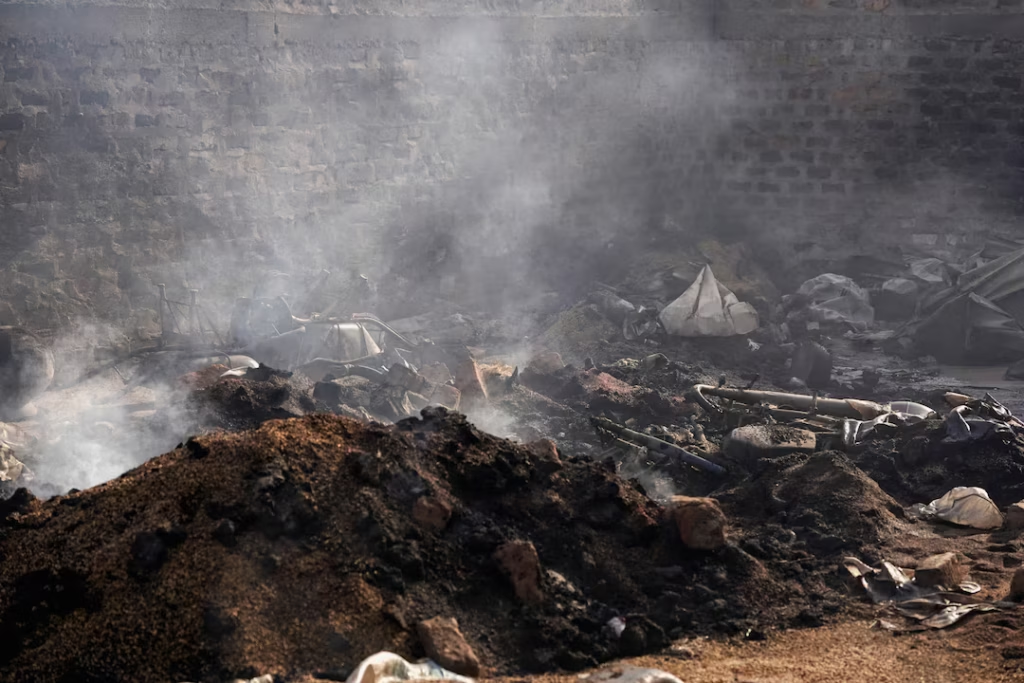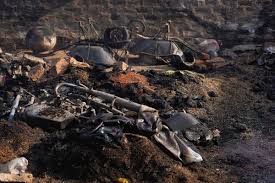YELWATA, Nigeria (BN240)— In the charred ruins of a central Nigerian village, Fidelis Adidi stood silently, staring at the smoldering remains of the room where he lost nearly everything. Hours earlier, Adidi had fled as heavily armed attackers stormed Yelwata under the cover of night. When he returned at daybreak, he found the burned bodies of his wife and four of his children.

“I lost five of my family members,” the 37-year-old farmer told Reuters, his voice strained and trembling. “My body is weak and my heart keeps racing.”
The massacre in Benue state—one of the deadliest in Nigeria this year—has left at least 180 people dead, according to Amnesty International, and displaced thousands more. It marks another grim chapter in the long-running and deadly conflict between herders and farmers in Nigeria’s volatile Middle Belt, where ethnic, religious, and land-use tensions continue to ignite horrifying violence.
The attack began Friday night and lasted until the early hours of Saturday. Armed men swept through the community of Yelwata, shooting indiscriminately and setting homes ablaze. Adidi had rented a room in the local market to shelter his two wives and children from the increasingly frequent clashes. But his precautions were no match for the ferocity of the assault.
His second wife and another child survived with severe injuries, while the small room they had sought as a haven was reduced to ash and ruin. Nearby, corpses burned beyond recognition lay next to heaps of singed farming tools and food supplies.
Market vendor Talatu Agauta, who is pregnant with her second child, narrowly escaped death by fleeing toward the state capital Makurdi when the gunmen arrived. She returned days later to find her entire stock—40 bags of rice—destroyed in the flames.
“It’s a devastating blow,” Agauta said, standing in the wreckage of her stall. “But I came back, and even if I die here, I don’t mind.”
Like many residents, Agauta refuses to abandon her home, despite the escalating insecurity that has gripped the region and left entire communities in ruins.
Benue state sits at the fault line between Nigeria’s predominantly Muslim north and Christian south, a fertile but combustible region long plagued by conflicts between nomadic herders and sedentary farmers over access to land and water.

The violence has persisted for years, but recent attacks—like the one in Yelwata—have grown increasingly brazen and deadly. Nigerian authorities, despite pledges and task forces, have struggled to quell the unrest, which experts warn could spiral into broader sectarian conflict.
President Bola Tinubu, calling the weekend bloodshed “depressing,” is scheduled to visit Benue on Wednesday, his first trip to the region since assuming office two years ago. His administration has come under growing pressure to address the security crisis that continues to claim lives across the countryside.
The National Emergency Management Agency (NEMA) said it is coordinating with humanitarian organizations to assist at least 3,000 people displaced by the Yelwata massacre. Temporary shelters have been erected, but access to food, water, and medical care remains limited.
As officials prepare for Tinubu’s arrival and vow stronger security measures, many in Yelwata remain haunted by the loss and doubtful of protection.
“I’ve buried four of my children in one day,” said Adidi, looking down at the scorched ground where his home once stood. “Nothing will ever be the same again.”
The Benue massacre underscores the urgent need for comprehensive solutions to Nigeria’s farmer-herder crisis—solutions that address not only security, but land reform, justice, and reconciliation.
Until then, villages like Yelwata remain vulnerable, and the cost of inaction is written in ashes and blood.



